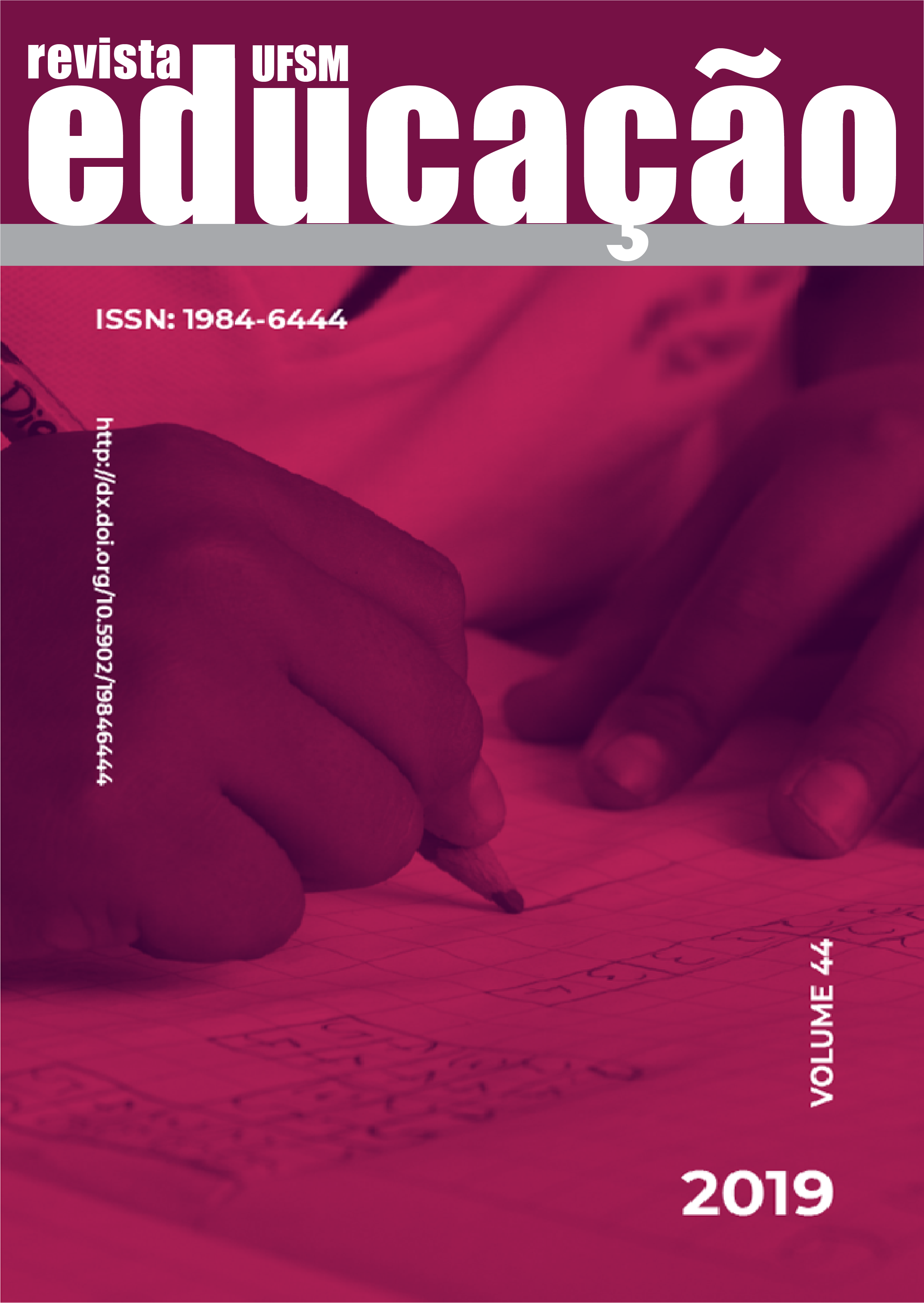Use of digital technologies in school: a study based on the reports of Brazilian Public Policies
DOI:
https://doi.org/10.5902/1984644436752Keywords:
Digital Culture in Schools, Digital Inclusion in Schools, ICT and Public Policies.Abstract
Education is a protagonist in the programs of countries that outlined the goal to value the life quality of its citizens. This situation points to the imminence of achieving a speedy, legitimate and effective return to the interruption of cycles of poverty and the establishment of objectives that promote freedom, harmony, and progress. Considering the context of public policies regarding the use of technologies in schools, the objective of this paper was to understand if the pedagogical proposal of digital inclusion is already a national reality. For this, a study was carried out based on 4 official documents. Among the issues raised is that there is not much difference regarding the use of ICTs between public and private schools, that the cell phone is pointed out as the medium through which the Internet is accessed the most and that when an institution emphasizes the digital culture, it assumes the centrality in the formation of more autonomous students.References
ALMEIDA, Fernando José de. Moçambique está ficando perto: depoimento. Entrevistadora: Nilce da Silva. Revista Eletrônica Acolhendo a Alfabetização nos Países de Língua Portuguesa, São Paulo, USP, 2007. (Depoimento: Entrevista concedida ao Grupo Acolhendo Alunos em Situação de Eaxclusão Social, da Faculdade de Educação da Universidade de São Paulo e Pós-Graduação em Educação de Jovens e Adultos, da Faculdade de Educação da Universidade Eduardo Mondlane. Disponível em: https://www.revistas.usp.br/reaa/article/viewFile/11451/13219. Acesso em: 17 jun. 2018.
ALMEIDA, Maria Elizabeth Bianconcini.; VALENTE, José Armando. Políticas de tecnologia na Educação Brasileira: histórico, lições aprendidas e recomendações. In: Centro de Inovação para a educação brasileira, 2016. Disponível em: http://www.cieb.net.br/wp-content/uploads/2016/12/CIEB-Estudos-4-Politicas-de-Tecnologia-na-Educacao-Brasileira.pdf. Acesso em: 10 out. 2017.
BRASIL. Lei nº 9.394, de 20 de dezembro de 1996. Estabelece as diretrizes e bases da educação nacional. Brasília: Ministério da Educação, 1996.
BRASIL. Lei 13.415, de 16 de fevereiro de 2017. Altera as Leis nos 9.394, de 20 de dezembro de 1996, que estabelece as diretrizes e bases da educação nacional, e 11.494, de 20 de junho 2007, que regulamenta o Fundo de Manutenção e Desenvolvimento da Educação Básica e de Valorização dos Profissionais da Educação, a Consolidação das Leis do Trabalho - CLT, aprovada pelo Decreto-Lei no 5.452, de 1o de maio de 1943, e o Decreto-Lei no 236, de 28 de fevereiro de 1967; revoga a Lei no11.161, de 5 de agosto de 2005; e institui a Política de Fomento à Implementação de Escolas de Ensino Médio em Tempo Integral.. Brasília, 2017.
BRASIL. Presidência da República. Secretaria de Comunicação Social. Pesquisa brasileira de mídia 2015: hábitos de consumo de mídia pela população brasileira. Brasília: Secom, 2014.
CASTELLS, Manuel. Cibercultura. São Paulo: Ed. 34, 1999.
CASTELLS, Manuel. A sociedade em rede. 8. ed. rev. e ampl. São Paulo: Paz e Terra, 2006.
CETIC. Marco Referencial Metodológico para a Medição do Acesso e Uso das Tecnologias de Informação e Comunicação (TIC) na Educação. In: Centro Regional de Estudos para o desenvolvimento da Sociedade da Informação – Brasil. São Paulo: Unesco, 2016.
CGI Br - COMITÊ GESTOR DA INTERNET NO BRASIL. Pesquisa sobre o uso das tecnologias de informação e comunicação nas escolas brasileiras: TIC educação 2015 [livro eletrônico] = Survey on the use of information and communication technologies in brazilian schools: ICT in education 2015. São Paulo: Comitê Gestor da Internet no Brasil, 2016.
GALIMBERTI, Umberto. Psiche e techne, o homem na idade da técnica. São Paulo: Paulus, 2006.
JESUS, Deise Cristina Carvalho de; TASSON, Elvira Cristina Martins. Escritas de mim: narrativas e a autoformação docente. EccoS – Rev. Cient., São Paulo, n. 44, p. 225-240, set./dez. 2017.
LÉVY, Pierre. Cibercultura. São Paulo: Ed. 34, 1999.
MORAES, Maria Cândida. Informática Educativa no Brasil: um pouco de História. Em Aberto, Brasília, ano 12, n. 57, jan./mar. 1993. Disponível em http://emaberto.inep.gov.br/index.php/emaberto/article/view/1877/1848. Acesso em: 17 jun. 2018.
UNESCO. TIC Educação e desenvolvimento social na América Latina e o Caribe. Montevideu: Unesco, 2017.
Published
How to Cite
Issue
Section
License
Declaration of originality
We declare that all articles present in the journal Educação (UFSM) are originals and were not submitted for publishing on any other publication, as a whole or a fraction. We also declare that, after being published by Educação (UFSM), a paper will not be submitted to another journal within two years. After this time, our journal transfers the publishing rights to the authors, with a permit granted by the Editorial Council.
We also acknowledge that the originals’ submission to Educação (UFSM) implies on a transference of copyright for physical and digital publishing to the journal. In case of noncompliance, the violator will receive sanctions and penalties predicted by the Brazilian Copyright Protection Law (n. 9610, dated 19/02/98).
Attribution 4.0 International (CC BY 4.0)
This license lets others remix, transform, and build upon the material for any purpose, even commercially, and copy and redistribute the material in any medium or format.

This work is licensed under a Creative Commons Attribution 4.0 International (CC BY 4.0)






